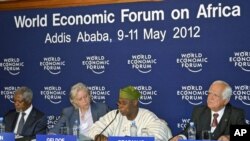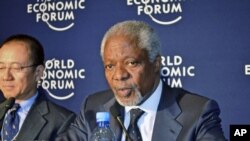ADDIS ABABA - The World Economic Forum on Africa has ended with a fresh call for the continent's leaders to deliver in areas ranging from jobs to justice and better governance. Former U.N. secretary-general Kofi Annan used the full weight of his reputation to pressure leaders to improve the lives of their citizens.
At 74, Kofi Annan is going strong. Six years after he completed two terms at the helm of the United Nations, the Ghanaian statesman is a driving force at this international gathering of business and political leaders.
With rock legend Bob Geldof at his side, Mr. Annan on Friday released a report card on Africa's progress. It warned that the continent's impressive economic growth is at risk as hundreds of millions of young Africans reach maturity over the next few years without jobs or hope of a better life.
"Growth is essential, but growth without jobs, justice and equity is a recipe for disaster," Anan said. "As we are seeing in the current dissatisfaction and frustration reverberating around the world, these deep and enduring inequalities in evidence across the continent are ethically indefensible, economically inefficient and potentially destabilizing."
The former U.N. chief said Africa's political progress is fragile, and in danger of sliding backward toward the bad old days of frequent military coups.
"The recent events in Senegal demonstrate how fragile our democracies are," said Annan. "Senegal gave us a wonderful example of how to hold elections. And the democratic reversals we've seen in Mali and Guinea also pose serious challenges for us."
Several events at this economic forum have addressed the pressing need to empower African women. Earlier, leaders spoke of the difficulty in recruiting qualified women to politics and government.
In his comments to reporters, Annan flatly rejected that line of thinking. "I have seen African political parties saying we cannot find women candidates. It's a lie," he said.
"There are plenty of good women candidates around," Annan continued. "The same political parties who cannot find women, if you were to come up with a quota, and to say one-third of the parliament should be women, they would suddenly find brilliant women candidates because they want to win."
Annan avoided commenting on his attempt to broker a peace deal in Syria, knowing anything he would say about his diplomatic mission would overshadow the points he wants to make about Africa. In comments to VOA, he said he will keep on using his voice as a force for change on the continent of his birth.
"It's still important and it's still necessary. It's a continent with big potential, and we should help to realize that potential," he said.
Q: Do you feel like you're making significant progress? Do you think you'll see it in your lifetime?
A: We are making progress, and I will see some of it in my lifetime, not all of it, and there will be others to carry on the struggle."
Annan said if he has one priority for Africa, it is education. With 60 percent of the continent's estimated one billion people under 30, he said an educated work force will be key to attracting the foreign investment needed to create the jobs that will be essential to sustaining political and economic stability.
At 74, Kofi Annan is going strong. Six years after he completed two terms at the helm of the United Nations, the Ghanaian statesman is a driving force at this international gathering of business and political leaders.
With rock legend Bob Geldof at his side, Mr. Annan on Friday released a report card on Africa's progress. It warned that the continent's impressive economic growth is at risk as hundreds of millions of young Africans reach maturity over the next few years without jobs or hope of a better life.
"Growth is essential, but growth without jobs, justice and equity is a recipe for disaster," Anan said. "As we are seeing in the current dissatisfaction and frustration reverberating around the world, these deep and enduring inequalities in evidence across the continent are ethically indefensible, economically inefficient and potentially destabilizing."
The former U.N. chief said Africa's political progress is fragile, and in danger of sliding backward toward the bad old days of frequent military coups.
"The recent events in Senegal demonstrate how fragile our democracies are," said Annan. "Senegal gave us a wonderful example of how to hold elections. And the democratic reversals we've seen in Mali and Guinea also pose serious challenges for us."
Several events at this economic forum have addressed the pressing need to empower African women. Earlier, leaders spoke of the difficulty in recruiting qualified women to politics and government.
In his comments to reporters, Annan flatly rejected that line of thinking. "I have seen African political parties saying we cannot find women candidates. It's a lie," he said.
"There are plenty of good women candidates around," Annan continued. "The same political parties who cannot find women, if you were to come up with a quota, and to say one-third of the parliament should be women, they would suddenly find brilliant women candidates because they want to win."
Annan avoided commenting on his attempt to broker a peace deal in Syria, knowing anything he would say about his diplomatic mission would overshadow the points he wants to make about Africa. In comments to VOA, he said he will keep on using his voice as a force for change on the continent of his birth.
"It's still important and it's still necessary. It's a continent with big potential, and we should help to realize that potential," he said.
Q: Do you feel like you're making significant progress? Do you think you'll see it in your lifetime?
A: We are making progress, and I will see some of it in my lifetime, not all of it, and there will be others to carry on the struggle."
Annan said if he has one priority for Africa, it is education. With 60 percent of the continent's estimated one billion people under 30, he said an educated work force will be key to attracting the foreign investment needed to create the jobs that will be essential to sustaining political and economic stability.





